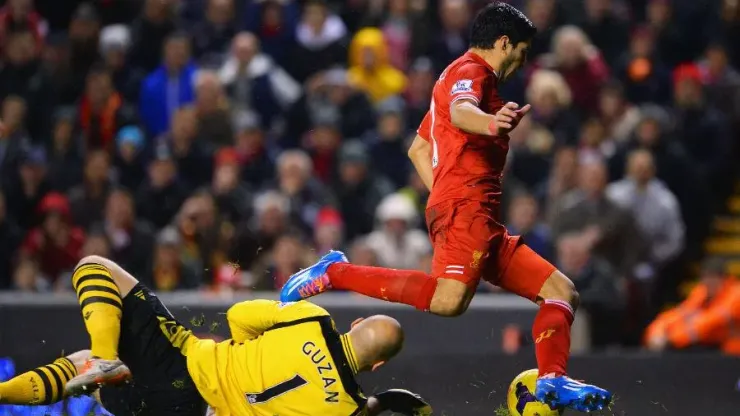In the review of this past weekend’s refereeing decisions in the Premier League, there’s only one place to start and thats at Anfield where Luis Suarez was judged to be brought down by Aston Villa keeper Brad Guzan. The score was 2-1 to the away side at the time, so this was no doubt a huge decision for referee Jon Moss to make.
Unfortunately, the referee was in a poor position for this call — not because of his fitness levels, but as a result of the pin-point cross field pass from Steven Gerrard. Moss is also unlucky as the incident is on the opposite side to the assistant, who would have been in a perfect position had it been on his side of the pitch.
From Moss’s angle, I can fully understand why he has given the penalty. With no help from the assistant referee, he has a decision to make and Guzan gives Moss that choice, when he didn’t need to commit to the challenge. I personally don’t think it was a penalty, but you have to understand the speed of the game and the distance the referee has had to make a very important call from, even though Suarez went down very easily. I feel Suarez used Guzan’s error to his advantage and was looking for contact, moving away from the direction of the ball and into the American keeper’s arms. I don’t think it’s a dive, but there is no doubting that Suarez looked for contact and went down when there was still a scoring opportunity.
Analyzing the incident on BBC’s Match Of The Day, pundit Alan Shearer and presenter Gary Lineker both thought it was a penalty. Shearer said:
”I think you’ve got to give the benefit of the doubt to Suarez there. I know he’s gone down too easy at times.
“If Guzan’s going to be silly enough to come rushing out like that on a wet pitch, sliding out. What is Suarez expected to do here?
‘Is he meant to jump over him and get out of the way and hurdle out of the way, so he doesn’t make contact with him?”
I know Shearer is a highly respected former player, but I have to question him. Condoning a player buying a penalty shows how much the game has moved on. TalkSport pundit Stan Collymore took the alternative view and thought that Suarez dived. Afterwards, he was involved in a heated Twitter conversation with Lineker, where Stan tweeted:
“And the fact some very well respected ex pros genuinely believe diving/cheating is justifiable says more about the game in 2014 than me.”
I see both points of view, but conclude that it wasn’t a dive, or a penalty. It was just “clever” play from Suarez, which is not good for the game.
Moving on to Manchester United’s 3-1 defeat at Stamford Bridge, there were two controversial decisions within the space of a minute, at the very end of the game. Firstly, United skipper Nemanja Vidic made a very late and reckless tackle on the again impressive Eden Hazard. I was as amazed as anyone when Phil Dowd produced the red card. I know I may be biased, but there is nothing in the challenge that is dangerous. It was a tackle in anger, but not a red card. There would have been no complaints from either team if a yellow card had been shown. Only seconds later, Rafael da Silva went in for an arguably worse tackle on Gary Cahill. The challenge was fast and with both sets of studs showing. It was a definite red card. However, Dowd cautioned the right back. I feel he may have been compensating for an earlier mistake, but ended up getting both decisions wrong.
Meanwhile, Wes Brown was again involved in a contentious decision, this time with Southampton’s record signing Gaston Ramirez. Brown did get the ball, but followed through to catch the Uruguayan on the ankle, causing him to be stretchered off. I think a yellow card would have been fair, as it was a genuine attempt for the ball and not with excessive force.
Manchester City front man Alvaro Negredo, was involved in a similar incident with Cardiff’s Aron Gunnarsson, but missed the ball and caught the Icelandic midfielder on the ankle, after the ball had gone. The tackle wasn’t pleasant and Negredo can count himself very lucky that referee Neil Swarbrick didn’t send him off. A poor tackle.
Finally this week, the first goal awarded by the Goal Decision System occurred. In the Cardiff-Manchester City match, the replay showed that the ball was comfortably in and proved the system works, although I’m not quite sure why the Cardiff players protested the goal, considering that there is a watch on the referee’s wrist that alerts him when a goal is scored.
Editor’s note: Read reviews of key referee decisions from previous Premier League weeks.
200+ Channels With Sports & News
- Starting price: $33/mo. for fubo Latino Package
- Watch Premier League, Women’s World Cup, Euro 2024 & Gold Cup
The New Home of MLS
- Price: $14.99/mo. for MLS Season Pass
- Watch every MLS game including playoffs & Leagues Cup
Many Sports & ESPN Originals
- Price: $10.99/mo. (or get ESPN+, Hulu & Disney+ for $14.99/mo.)
- Features Bundesliga, LaLiga, Championship, & FA Cup
2,000+ soccer games per year
- Price: $5.99/mo
- Features Champions League, Serie A, Europa League & Brasileirāo
175 Premier League Games & PL TV
- Starting price: $5.99/mo. for Peacock Premium
- Watch 175 exclusive EPL games per season






